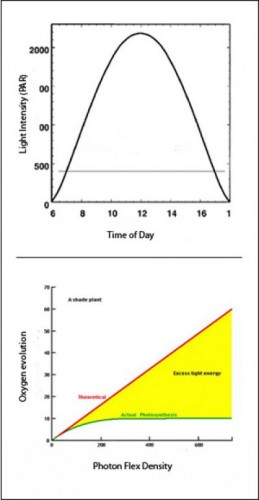Solar cells more efficient than photosynthesis — for now
May 13, 2011

The response of photovoltaics to the sun's intensity is linear (red line, bottom graph). Plants, on the other hand, are quickly overwhelmed and begin dumping excess energy they don't have the capacity to process (green line, bottom graph), so they can't make use of much of the sun's output. (Credit: Blankenship/WUSTL)
Solar cells are currently more efficient at converting light to energy than plants, but that will change with synthetic biology and genetic engineering, Robert Blankenship of Washington University and colleagues argue in an article in the latest issue of Science.
In a detailed analysis, they compare the pros and cons of photosynthesis and solar cells. Plants are naturally less efficient because they must power a delicate organism, while solar cells just send electricity down a wire.
Plants have benefits that solar cells do not: they produce high-energy liquid fuels and have low capital costs. The researchers stress that in evaluating the potential of plants and solar cells, variables other than efficiency are important, such as life cycle costs and environmental impact.
The researchers suggested replacing one of the photosystems in plants with a photosystem from a species of cyanobacteria. This would double the efficiency of photosynthetic plants, they estimate.
Ref: Robert E. Blankenship, et al., Comparing Photosynthetic and Photovoltaic Efficiencies and Recognizing the Potential for Improvement, Science 332, 805 (2011); DOI: 10.1126/science.1200165